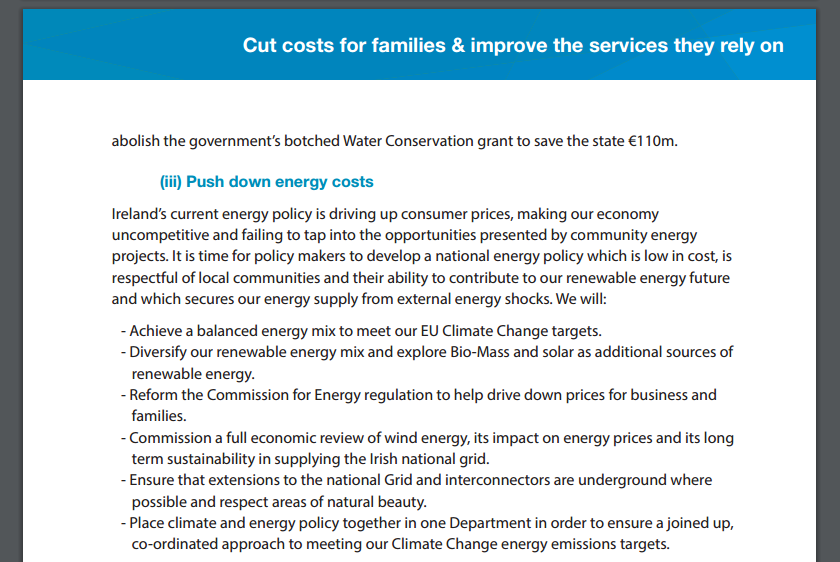Election Diary Feb 16th: Fianna Fáil’s manifesto surprises on Climate Justice fund

February 16th, 2016

Following a leader’s debate in which the environment or climate change received no mention, we must continue to delve into the back pages of manifesto documents to establish what policies are being put forward by the next Dáil hopefuls. Today’s Election Diary examines the content of Fianna Fáil’s manifesto for robust environmental policies.
Public Transport Planning Policy
The party’s effort to set out a plan for decarbonising transport in Ireland is reasonably worked out. Commensurate with the scale of infrastructure development that is needed “in light of the serious challenges of climate change”, they propose the establishment of a new National Infrastructure Commission. In a shift away from the 5 year cycle of current capital plans, this body will be tasked with planning ahead over a 25 year period, which would mean that investment in areas such as public transport can be more effective in contributing to coherent systems. They intend to restore the Public Service Obligation subvention to CIE to 2011 levels, discount public transport fares for young people to encourage habit creation and increase the uptake of E-cars to 10% of the national fleet via a variety of financial incentives. However, the plan is short on figures, and continuing to prioritise motorways such as M20 from Cork to Limerick is at odds with their claim to be “in support of a modal shift from private car to public transport”.
Water Charges
As with many other parties, such as Renua, AAA/PBP, Soc Dems, and Sinn Féin, Mícheál Martin’s party propose to do away with water charges. While much of the bad sentiment towards the establishment of Irish Water can be understood, this party fails to propose a mechanism that would secure the nation’s water supply at times of low rainfall or discourage everyday overuse of water, which has environmental impacts in that treating water consumes energy.
Energy Policy and Climate Change
Mentions of Energy Policy appear within the section entitled “Cut costs for families & improve the services they rely on”. They state that community energy projects represent an untapped opportunity, but do not elaborate upon what they would do to support these. Any extensions to the national grid under a Fianna Fáil government would “respect areas of natural beauty” and locate underground where possible. They would commission research into the economic feasibility of Bio-mass, Solar and Wind energy, but make no commitments to invest in any of these in the short term, and so it seems that we would remain heavily dependent on importing fossil fuels to meet our energy needs. Their support for the plans to expand the agricultural sector under the Food Harvest 2020 and Food Wise 2025 plans would see Ireland’s most emissions-intensive sector heavily reliant on animal-based agriculture.

It would almost appear that Fianna Fáil were overlooking the challenge posed by climate change were it not for their proposal to “place climate and energy policy together in one Department in order to ensure a joined up, co-ordinated approach to meeting our Climate Change energy emissions targets”. This new ‘Department of Climate Change’ would bring together the current departments of Environment, Flood Defence, Energy, Transport, Natural Resources, & Heritage, which displays some commitment to addressing the issue in a more coherent manner. They propose amending the role of the Sustainable Energy Authority of Ireland, to develop a Green Deal Agency. This agency would access funding from various European sources to facilitate Irish homeowners to invest in green initiatives in their homes, such as retro fitting and microgeneration of renewable energy. The most impressive and unambiguous promise in relation to climate change is to increase our contribution to the Green Climate Fund by €13m. The 2016 budget allocated a mere €2 million to this fund which contributes towards serving Climate Justice in developing nations, and was criticised as being too small a commitment in proportion to the warming caused by our high per-capita emissions. Fianna Fáil’s proposed increase to this fund is very welcome, provided that it doesn’t cut sorely needed environmental funding elsewhere.
[x_button shape=”square” size=”regular” float=”none” href=”https://www.fiannafail.ie/download/An-Ireland-for-all-Fianna-FaCC81il-Manifesto.pdf” info=”none” info_place=”top” info_trigger=”hover”]Click here to read Fianna Fail’s manifesto[/x_button]
[x_author title=”About the Author”]







